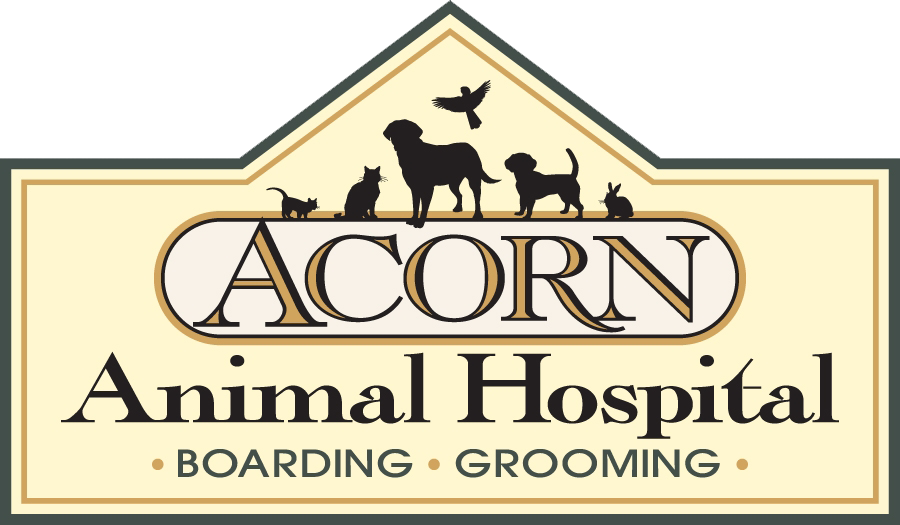Food, feasting and family—we wait all year for these happy occasions. However, they are not always so happy for our pets. Pets who overeat or get into the trash are at risk for bloat, pancreatitis, toxin ingestion, and gastrointestinal obstructions, and travel and stranger-danger also are concerns. Follow Acorn Animal Hospital’s tips to keep your Thanksgiving holiday safe and enjoyable for everyone, two- and four-legged.
#1: Keep unbaked dough out of pets’ reach
Unbaked dough will continue to rise inside your pet’s warm stomach, which can result in severe abdominal pain, and lead to a gastrointestinal obstruction, a life-threatening surgical emergency. Keep unbaked dough out of pets’ reach, particularly during the rising period. Call us right away if your pet ingests unbaked dough.
#2: Stash trash away from pets
Leftovers not only smell wonderful to you, but also to your dogs or cats. Raiding the trash, however, and eating bones and wrappers, can result in an obstruction for your pet, like the unbaked dough. Gobbling excessive amounts of food can also lead to bloat or a twisted stomach, both life-threatening emergencies. Keep trash in a covered container that dogs and cats can’t open. Also, don’t leave food debris in easy reach of an inquisitive pet. Cats can jump on counters, while dogs will “countersurf,” or perhaps lift a turkey carcass right off the table, because they cannot resist the temptation.
#3: Beware of desserts that may be toxic to pets
Chocolate, raisins, and xylitol (i.e., a sugar substitute) may be necessary ingredients in your favorite desserts, but all are extremely toxic to animals. Unfortunately, pets, like people, often find desserts delicious. Remember that baking chocolate, especially dark or baker’s chocolate, can be particularly toxic for pets, and must be kept out of reach. If you find your dog has eaten any of these foods, no matter the amount, contact us as soon as possible for treatment.
#4: Keep fatty foods away from your cats and dogs
Turkey skin, sausages, cooking grease, and gravy can cause pancreatitis, an extremely painful and serious condition in some pets. Think twice before letting dogs lick pots and pans, and caution your table guests against offering these treats to your pets. Call us if you think your pet has eaten any of these foods, and is showing signs of distress.
#5: Remember that guests may stress out your pets
Some pets are frightened by strangers at the door; others become overstimulated by guests and may misbehave. Some may escape if a front door is left open. A guest’s young children may make pets nervous, or be overly rough with them. Give your dog or cat a safe room in your home where they can escape if they need a break from company. Ensure the door can be closed and your pet can relax with a favorite toy or snack, and explain to your younger guests that this room is only for pets. A microchip can help reunite you with your pet should they become lost. We can microchip your pet at our clinic—microchipping is a quick, pain-free procedure that does not require anesthesia.
# 6: Plan in advance for traveling with your pet
If you’re driving this Thanksgiving, prepare your pet for travel to decrease their stress level. With a cat, acclimate them to their carrier a few weeks in advance by feeding them their favorite morsels inside, keeping the door open until they’re used to the carrier. With dogs, choose a route that allows you to take them out every two hours to relieve themselves, and to stretch their legs. Offer small amounts of water at each rest stop. If your pet suffers from carsickness, ask us about prevention medications. Pack your pet’s usual food to decrease the possibility of an upset tummy. Always restrain your pets in your car with a seat belt, including the carrier with your pet inside. Remember, if you’re crossing state lines, your pets must be vaccinated against rabies and have a health certificate—we can help with both. Finally, never leave animals in vehicles, because car temperatures can be more extreme than outdoor temperatures. This time of year, weather can be unpredictable, and cats and dogs will suffer in excessive heat and cold.
#7: Organize a boarding facility or pet sitter in advance

On the other hand, if you’re leaving your pets behind this year, decide whether you prefer a pet sitter to stay with them or to board them. Every boarding facility has its own requirements regarding behavior assessments and vaccinations, which must be completed several weeks before your pet arrives, so don’t delay. With either a pet sitter or boarding, establish instructions if you can’t be reached and your pet becomes sick or has an emergency, including contact information, your veterinarian of choice, and what should be done. Discussing pet preferences and your other concerns will give you peace of mind while you travel.
Our Acorn Animal Hospital team wishes you a happy and safe Thanksgiving—but don’t hesitate to contact us if your pet gets into holiday trouble.
